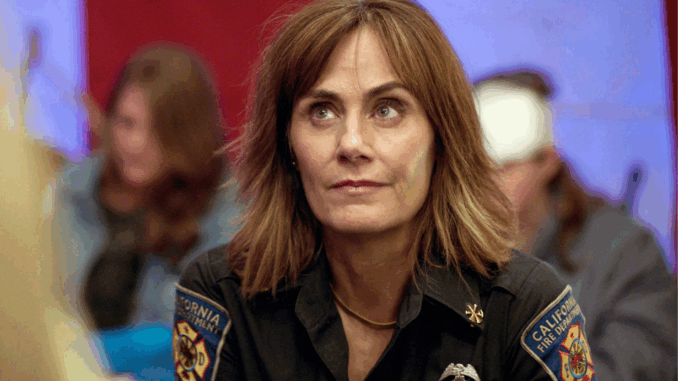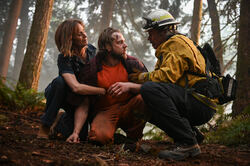
In the wake of Vince Leone’s tragic demise, Fire Country shifts part of its emotional and thematic focus to Sharon Leone — the iron-willed Cal Fire commander and grieving widow. Season 4 positions Sharon not only as a leader grappling with loss but as a woman navigating the delicate terrain of reinvention. As the flames of grief rage around her, Sharon stands tall, commanding the line between chaos and control.
From the very first scene following Vince’s death, the weight of responsibility on Sharon’s shoulders is immense. She must not only absorb the personal devastation of losing her partner of decades but also lead her unit through a time of great transition. As the highest-ranking officer at Three Rock, Sharon faces scrutiny from the public, pressure from new leadership (in the form of Chief Vega), and skepticism from within her own ranks.
Diane Farr’s performance is a masterclass in restrained power. Sharon is a woman who feels everything — and shows almost nothing. Her grief simmers beneath a controlled exterior, released only in private moments, such as a poignant scene where she watches old videos of Vince giving safety talks to new recruits. Alone in the office they once shared, she weeps — silently, powerfully, completely.

Despite her pain, Sharon wastes no time in reinforcing structure. She champions new mental health protocols for her crew, recognizing that emotional suppression, especially in high-risk environments, is a silent killer. She also begins mentoring younger female firefighters, stepping into a role she once deferred to Vince — the nurturer, the moral compass.
Conflict with Chief Dante Vega emerges quickly. Vega’s uncompromising approach to reform often clashes with Sharon’s people-first leadership style. Their dynamic adds a compelling layer to the show’s evolving power structure. In one particularly charged meeting, Vega questions her decision to keep Bode at Three Rock, implying favoritism. Sharon’s response is swift and cutting: “I’ve earned every decision I make. And I’ll stand by them, even if it breaks me.”
But perhaps the most powerful aspect of Sharon’s journey is her internal reckoning. Without Vince, who is she? For years, they were a team — in life, in love, in leadership. Season 4 slowly unspools Sharon’s rediscovery of identity as an individual. She revisits dreams long buried — from rebuilding her father’s old cabin to reapplying for a suspended fire command course she once abandoned due to family obligations.
Sharon Leone in Season 4 is a woman torn between past and future, duty and desire, vulnerability and unshakable resolve. Her evolution reflects not just personal growth, but a commentary on what it means to lead while grieving, to nurture while hurting, to endure without becoming hardened.
As Fire Country pushes forward, Sharon’s story may very well become the emotional compass of the series. In the absence of Vince, she rises — not as a replacement, but as a reinvention. And that rise, both quiet and monumental, may just be the show’s most courageous act yet.
